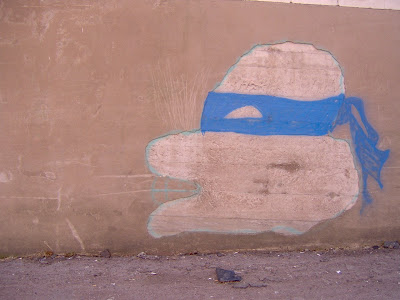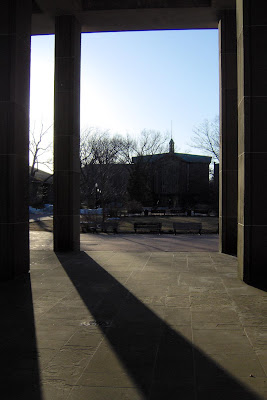jueves, 24 de abril de 2008
The 'victory' in 'victory lap'
Things I have done since the end of classes:
1. Gone to the gym... once.
2. Baked some labour-intensive enchiladas.
3. Planned a trip to Boston.
4. Cancelled a trip to Boston.
5. Gone to trivia at the Pub, without winning a round.
6. Played "Young Players'" Trivial Pursuit at Ducky's; felt better about myself.(Sample question: "What do Invisible Boy's super powers allow him to do?"
7. Worked at Computing Services and Student Services; earned some money for the summer.
8. Felt anxious about the future.
9. Gotten caught up on Girlicious.
10. Had a friend straighten my hair (a now 3-hour process).
11. Been promoted to Captain on the Windows Pinball game.
12. Learned how to cheat at Windows Pinball.
13. Played baseball on the town field.
14. Played catch in the Memorial Park.
15. Eaten a McFlurry.
16. Learned how to make a Long Island iced tea.
17. Made sushi.
18. Bought a couple of novels from Rags of Time.
19. Eaten breakfast at Mel's.
20. Bought two pairs of thrift-store shoes.
21. Helped to organize a friend's birthday party that included 5 cakes.
22. Baked a carrot cake that was supposed to look like a sushi roll, with marginal success. (It tasted good.)
23. Eaten a LOT of cake.
24. Read a book on a blanket by the swan pond.
25. Slept in.
26. Cleaned my laptop keyboard.
27. Paid off my library fines ($13.75).
28. Rehearsed a play to be performed on Convocation Weekend (Noel Coward's "Hayfever").
29. Kept my room clean.
Things I have not done since the end of classes:
1. Laundry
sábado, 12 de abril de 2008
The big picture in a small town
 I finally charged my camera batteries and started to carry it around town and campus. As a result, I have some photos of my favourite Sackville graffiti. First, the Ninja Turtle created out of chipped stucco, and second, the "thesis" tag that I have seen around town.
I finally charged my camera batteries and started to carry it around town and campus. As a result, I have some photos of my favourite Sackville graffiti. First, the Ninja Turtle created out of chipped stucco, and second, the "thesis" tag that I have seen around town.
I think the "thesis" tag is particularly funny - some strange combination of academics and delinquency. I hope whoever wrote it has actually written a thesis at some point. (By the way, I haven't. My roommate is currently in the throes of her first draft, to be submitted tomorrow.)
The semester is winding down; I have two more papers to submit, and no final exams. I am looking forward to reading, running, baking, sleeping, and maybe going on a road trip or two.
Since I have some extra time, I have been giving more campus tours. This week I gave a tour to a middle school group on their annual band trip. According to the kids, no festivals coincided with the trip, and so the group was travelling to Fredericton to see some museums and then to tour the Sydney mines. On the way, they stopped at Mt. A - the band teacher is a 1991 alumnus. It was fun to adjust the tour to kids who had no context for university - when I took them into auditoriums, meal hall and the library I could hear a whispers of "Whoa! This is huge!" I took them to see a residence, and all 15 of them piled into some poor girl's room. They took photos of the classrooms and the swan pond - everything was new and exciting. It was nice to be reminded of how bizarre and exciting university really is - I suppose we lose sight of the uniqueness of living and studying and eating together in big rooms on a small campus.
Just before the sun sets, campus looks particularly lovely. Here's a photo taken from the breezeway looking out at the chapel.

sábado, 5 de abril de 2008
Blueberries, policy wonks and Mexican refugees
Yesterday I attended the tenth national Metropolis conference in Halifax. Metropolis is a network of scholars, bureaucrats and advocates who work in the field of immigration. It has chapters in over 20 countries, including one in Canada.
The conference is taking place in Halfax's World Trade and Convention Centre, where I attended an international summit in 2006 on microcredit.
Based on these two events, I have developed a major beef with high-profile conferences. Upon registration ($152.55 for one day - thankfully covered by Mount Allison), I received a one-shoulder backpack full of pamphlets, journals and brochures. While I appreciated the journals and the conference schedule, the rest of the package was mostly irrelevant. The backpack, which reminds me of the fleeting one-shoulder trend in middle school, will likely end up at the Salvation Army.
Right after I arrived, lunch was served. It was an impressive array of fruits (cantaloupe, blueberries, strawberries, honeydew melon, grapefruit), vegetables, sandwich makings and drinks. Dessert was strawberry shortcake.
Somehow I couldn't reconcile the mission of the conference with some of its amenities. I don't need another backpack, and I doubt the mostly middle-aged participants are going to wear the one-shoulder to their office jobs. The food could have been local, or organic; the coffee could have been fair trade. It is possible to adjust large events to run more sustainably - the Hillside Festival in Guelph is a great example. Even to attend the conference, people flew from across the country and even across the world. I was looking for a bit more innovation to make the conference practically sensitive to environmental and social issues.
Onto the sessions. The first session I attended, "Current Research, Dissemination and Mobilization on Refugee Issues," was a small round table featuring a policy analyst from Citizenship and Immigration Canada and the director of the York Centre for Refugee Studies. The main theme of the talk was the tension between civil society, academia and the government when it comes to protecting refugees. The CIC employee discussed the need for "evidence-based research," and the academics talked about the impossibility of gathering enough evidence from such a transient and vulnerable population.
The second session, "The Challenges of Becoming a Welcoming City," was a round table featuring members of the Windsor, Ontario community. The municipality has gone from receiving 16 refugee claimants in 2006 to the current average of 50 claimants a month. The first group of claimants came from Mexico, the second, from Haiti. I went because of a summer project I did on Mexican refugee claimants. (It turned out that the research supervisor of a student I know conducting a similiar project also attended the round table.)
In the evening I attended two documentaries about immigration issues in Canada. The first followed a 100-person march from Montreal to Ottawa in June, 2005. The second was about Francophone-African settlement in the West of Canada. Following the films, a discussion began with the film makers. It was a neat moment - the discussion was almost entirely in French (as were the films), and once again the bilingualism of Canada played out in front of me.
The conference was a nice academic boost, and at the same time, a bit humbling. The issues of homelessness, resource communities, the Alberta tar sands and migration all came up over the course of the session - and are all topics that I have studied this semester. After being at the same school for five years, I feel confident in my classes and able to speak up on most topics. At this conference, however, I felt a bit out of place; I still have a lot to learn about the academic and political context of migration, and tried to be quiet and listen for a while.
The biggest benefit of the conference, for me, was the clear distinction I saw between the four groups dealing with migration issues: the bureaucrats (or "policy wonks"), the academics, the social workers (NGOs) and the lawyers. I realized that I have been thinking about each of these four arenas without laying them out as distinct options. I still haven't figured out where I would be most comfortable and effective.
In terms of my future, I have an internship interview on Friday. I have also been accepted to present my summer research at a conference hosted by York in June. Exciting times.
Suscribirse a:
Entradas (Atom)